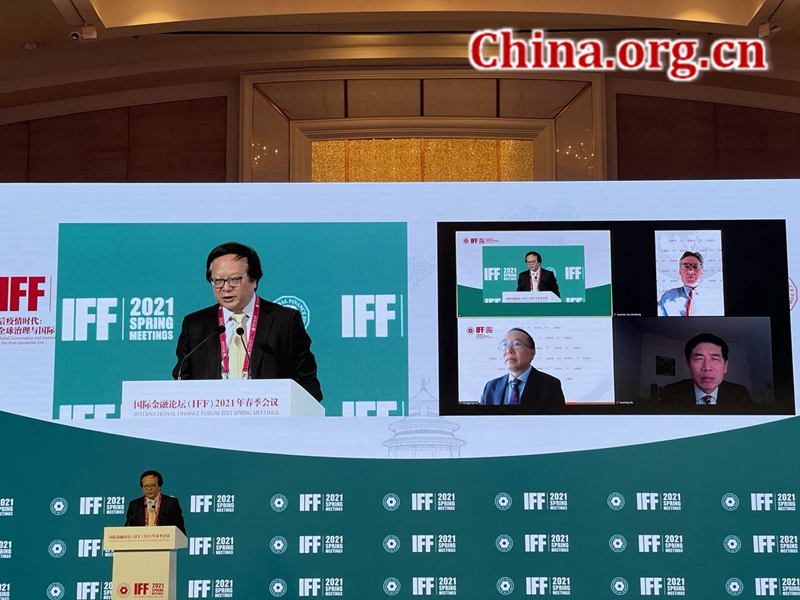Decarbonization offers opportunities for investment, innovation
- By Zhang Liying
 0 Comment(s)
0 Comment(s) Print
Print E-mail China.org.cn, June 1, 2021
E-mail China.org.cn, June 1, 2021

Since the Paris Agreement, a total of 126 countries have committed to achieving net-zero carbon emissions. The global decarbonization drive is making a deep impact on various industries and presenting new opportunities for both investment and technological innovation.
Speakers at the recent International Finance Forum (IFF) 2021 Spring Meetings shared their views on how to advance a new round of technological revolution and industrial transformation, and promote the green recovery of the world economy in the post-pandemic era.
Deborah Lehr, vice chairman and executive director of the Paulson Institute, said that in addition to the priority companies are placing on their own carbon-neutral transformation, current investment opportunities are at a scale not seen since the tech boom in the 1990s.
A new, broad measure of "energy transition investment," compiled by research organization BloombergNEF, showed that the world committed a record $501.3 billion to decarbonization in 2020.
Speaking at the IFF Carbon Neutral Summit on Sunday, Lehr said that China is going to be at the heart of this climate business boom, not only because its scale of emissions creates opportunities, but also because the country is becoming a leader in innovating green finance and clean technology.
Chen Wenhui, vice chair of China's National Council for Social Security Fund, said decarbonization may bring profound changes to every aspect of society, just as digitalization has done.
In order to grasp the opportunities presented by the potential economic and social transformations, investment institutions need to have long-term vision and make long-term plans, he said.
In terms of pursuing the high-quality development of the Belt and Road cooperation, Wang Yanzhi, president of the Silk Road Fund, stated that it is necessary to consider the influence of climate change and carbon goals on the economic restructuring of countries.
"We need to increase investment in fields related to carbon neutrality, and explore optimal resource allocation that is more in line with environmental and social requirements," he said.
Liu Hongpeng, director of the Energy Division in the United Nations Economic and Social Commission for Asia and the Pacific (ESCAP), emphasized the importance of international and regional cooperation in finding and taking advantage of investment opportunities.
"More than ever, the global response to the COVID-19 pandemic has added a new context for addressing the combined climate and energy challenges," Liu said.
He advised diversifying traditional COVID-19 stimulus packages into green packages, focusing more on low-carbon and sustainable areas.
According to Yu Honghui, general manager of China Energy Conservation and Environmental Protection Group, technological innovation plays an essential role in promoting China's eco-environmental progress under the new development paradigm.
It is important to expand the integrated application of green and low-carbon technologies to achieve utility-scale zero carbon and lead the regional green transition, Yu said.
Zhai Yongping, chief of the Energy Sector Group at the Asian Development Bank (ADB), explained that going carbon neutral involves three steps: reducing carbon intensity, peaking carbon emissions, and achieving carbon neutrality.
He said each of the steps requires innovation in technology, business models, and finance. "Financial innovation can help bring about more technological innovations, which need new business models to ensure their application," he added.
The IFF is an independent, non-profit and non-governmental organization, jointly established by more than 20 countries and international institutions in Beijing in October 2003. It serves as a platform for communication and research in the global financial sector.
The 2021 Spring Meetings, held on the weekend of May 29-30, brought together more than 500 participants both in-person and via video link to discuss the theme of "Global Governance and International Cooperation in the Post-Pandemic Era."






Go to Forum >>0 Comment(s)